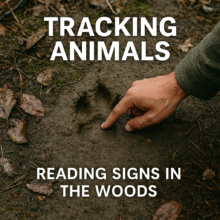The Hunter’s Ethos: What It Takes to Be A Successful Hunter in the Field

Table of Contents
Introduction
Success in hunting transcends the act of harvesting game. It embodies a comprehensive blend of skills, ethics, and a deep connection with nature. This exploration delves into the core attributes that define a successful hunter, offering insights for both novices and seasoned veterans to enhance their approach to hunting.
Chapter 1: Mastery of Skills
1.1 Precision and Patience
- Marksmanship: Proficiency with your chosen weapon is foundational. This includes not only the ability to shoot accurately but also understanding ballistics, how environmental factors affect the shot, and maintaining your equipment in peak condition.
- Stealth and Patience: The art of moving silently, blending into the environment, and waiting for the right moment is crucial. Success often comes to those who observe patiently and act decisively.
1.2 Knowledge of the Quarry
- Behavioral Understanding: Knowing the habits, food sources, and seasonal movements of your target species can significantly increase your chances of success.
- Tracking Skills: The ability to read signs left by animals, such as tracks, scat, and bedding areas, is essential for locating game and interpreting their movements.
Chapter 2: Ethical Considerations
2.1 Respect for Wildlife
- Conservation Mindset: Successful hunters view themselves as stewards of the environment, understanding the role of hunting in wildlife management and conservation.
- Humane Practices: Ensuring quick, humane kills to minimize suffering is a paramount concern, reflecting respect for the animal and the sport.
- Regulatory Compliance: Adherence to game laws, bag limits, and hunting seasons is non-negotiable, safeguarding wildlife populations for future generations.
- Landowner Relations: Respect for private property, securing permissions where necessary, and leaving no trace are marks of a conscientious hunter.
Chapter 3: Connection with Nature
3.1 Immersion in the Wilderness
- Outdoor Skills: Navigation, camping, and survival skills allow hunters to safely and effectively immerse themselves in the hunting environment.
- Environmental Awareness: A successful hunter is attuned to the nuances of the natural world, from changing weather patterns to the interconnectedness of ecosystems.
3.2 The Hunter’s Ethos
- Reflection and Growth: Time spent in pursuit of game offers opportunities for personal reflection, growth, and a deeper appreciation of life’s cycles.
- Legacy and Mentorship: Passing on knowledge and ethical practices to new hunters ensures the continuation of a respectful hunting tradition.
Chapter 4: Adaptive Strategies and Lifelong Learning
4.1 The Importance of Adaptability
- Evolving Techniques: The most successful hunters are those who can adapt their methods to changing conditions, environments, and behaviors of game. This might mean switching tactics from still hunting to spot-and-stalk based on the terrain or altering calls and decoys in response to animal reactions.
- Technological Advancements: Embracing new technologies, whether it be in the form of advanced optics, GPS devices, or the latest in camouflage and scent control, can provide hunters with an edge. However, it’s critical to balance technology with traditional skills to ensure a holistic approach.
4.2 Commitment to Continuous Improvement
- Education and Certification: Engaging in formal education programs, certifications, and conservation workshops not only broadens a hunter’s knowledge base but also enhances their credibility and commitment to the sport.
- Self-Reflection and Analysis: Successful hunters regularly reflect on their experiences, analyzing what worked, what didn’t, and why. This introspective approach fosters growth and improvement.
Chapter 5: Community Engagement and Conservation Efforts
5.1 Building a Supportive Community
- Networking and Clubs: Joining hunting clubs and online communities can provide valuable support, shared knowledge, and opportunities for advocacy. It’s also a platform for sharing successes and learning from collective experiences.
- Mentorship and Sharing Knowledge: Experienced hunters have a responsibility to mentor novices, sharing the traditions, ethics, and skills that underpin successful hunting. This mentorship ensures the longevity and sustainability of hunting practices.
5.2 Active Participation in Conservation
- Wildlife Management Projects: Many hunters volunteer for habitat restoration projects, wildlife population surveys, and other conservation initiatives. This active participation is crucial for the maintenance of healthy ecosystems and sustainable game populations.
- Advocacy for Hunting Rights and Conservation Policies: Successful hunters often become advocates for hunting rights, ensuring that regulations reflect a balance between conservation needs and hunting traditions. Engagement with policymakers and participation in public forums are ways hunters can influence positive outcomes for wildlife management.
Conclusion
The journey to becoming a successful hunter is ongoing, requiring dedication to skill development, ethical conduct, and a profound respect for nature. It’s about embracing the challenges, learning from each experience, and fostering a sustainable relationship with the wilderness. Through this holistic approach, hunting transcends the act of harvesting game, becoming a meaningful engagement with the natural world.
Frequently Asked Questions (FAQs)
1. How long does it take to become a proficient hunter?
- Proficiency in hunting is a lifelong pursuit, with skills and knowledge deepening over years of experience and continuous learning.
2. Can ethical hunting positively impact wildlife populations?
- Yes, when conducted within regulatory frameworks, ethical hunting can contribute to healthy wildlife populations and habitat conservation efforts.
3. How can I improve my tracking skills?
- Practice in the field, study from experts, and engage in tracking workshops or courses to enhance your tracking abilities.
4. What’s the best way to introduce someone to hunting?
- Mentorship, focusing on safety, ethics, and basic skills, combined with patient, hands-on experiences in the field, can effectively introduce newcomers to hunting.
5. Is it necessary to be physically fit for hunting?
- While physical fitness can enhance your ability to navigate challenging terrain and increase your overall enjoyment, hunting can be adapted to various fitness levels with appropriate planning and strategies.







